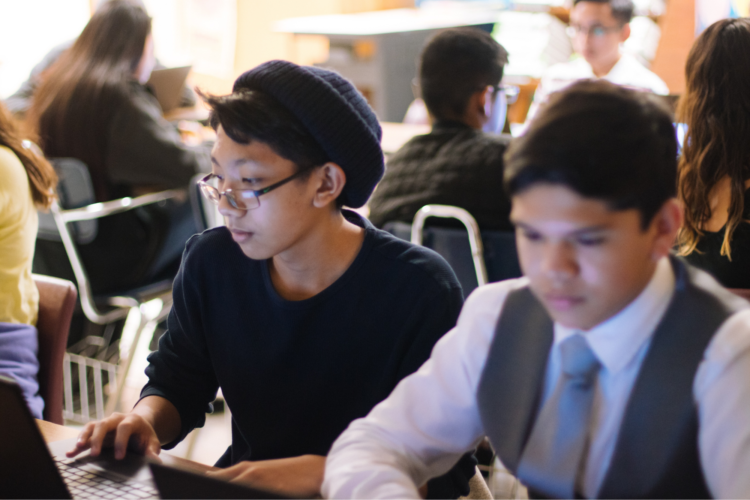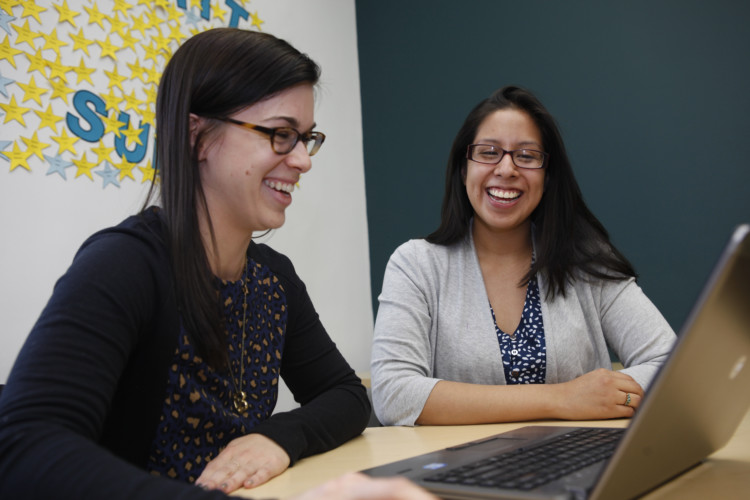We are proud to announce eleven new research grants, totaling nearly $5.5 million, in support of six studies on ways to reduce inequality in youth outcomes and five studies on strategies for improving the use of research evidence in ways that benefit young people.
Approved by the Foundation’s Board in fall 2023 and spring 2024, these grants will help build theory and empirical evidence in our two focus areas.
Research Grants on Reducing Inequality
Assessing the Effectiveness of School District Safe-Zone Policies in Narrowing Achievement Gaps among Minority Students: Evidence from California
Catalina Amuedo-Dorantes, University of California, Merced; Jose Bucheli, University of Texas at El Paso
4/1/2024–3/31/2026, $138,286
Do school district safe zone policies improve academic outcomes for Hispanic and other marginalized students?
Existing literature has documented the negative impacts of intensified immigration enforcement on the educational attainment of students with an undocumented family member and immigrant origin students . The state of California, where 56% of the K–12 student body is Hispanic and 44% come from households headed by immigrants, enacted state law AB 699 in 2017 to ensure access to education free from intimidation or discrimination. In response, school districts across the state have enacted safe zone policies. These policies can improve student outcomes by prohibiting discrimination; lowering the trauma associated with fear of encountering immigration authorities; and providing financial, legal, and academic resources to students and their families—benefits that may extend to racially minoritized students more broadly. Amuedo-Dorantes and colleagues will assess whether, how, and when safe zone policies help reduce the harmful effects of immigration enforcement on the achievement gap for Hispanic students and English Language Learners (demographic identifiers commonly used when data on immigrant status is missing or incomplete). They will use a series of difference-in-differences models to examine whether the implementation of safe zone policies improves outcomes for Hispanic, Black, and English Language Learner students and reduces inequalities for each group compared to non-Hispanic White students. The team will also assess the robustness of their findings. Findings could shed light not only on the question of whether safe-zone policies are effective, but which policy components better support students most likely to be affected by restrictive immigration policies.
Reducing Inequality in Academic Outcomes Through Personalized Learning
Monica Bhatt and Jens Ludwig, University of Chicago; Shira Mattera, MDRC
4/1/2024–3/31/2027, $450,000
Does high dosage tutoring at scale reduce academic inequalities by race, ethnicity, and economic standing?
Extant literature has documented the many ways in which the pandemic exacerbated inequalities in academic outcomes, particularly for students of color and students from low-income families. High-dosage tutoring (HDT) has been shown to be a highly effective strategy to improve academic outcomes but is often resource-prohibitive for many school districts. A promising strategy for scaling this model at cost is sustainable high-dosage tutoring (SHDT), which alternates in-person tutoring with high-quality computer-assisted learning. Bhatt and colleagues will examine data from a large-scale randomized controlled trial to test whether HDT and SHDT have similar effects in reducing academic inequalities for Black, Latinx, and Native American students and students from low-income families. The team will examine dosage data in each site, as well as surveys with tutors and site coordinators about intervention content, program delivery, and facilitators and barriers. They will also estimate intent-to-treat and treatment-on-the treated effects on pooled data across school district sites, grades, and subject. To examine whether and how HDT and SHDT reduce inequalities, the team will separate impact estimates for: free-and-reduced price lunch eligible students versus those who are not eligible, and students by race and ethnic background. Findings will provide evidence on scaling a promising intervention to address academic inequalities.
Community-Driven, Technology-Guided School Rezoning to Reduce Economic Segregation
Nabeel Gillani, Northeastern University; Genevieve Siegel-Hawley, Virginia Commonwealth University
5/1/2024–7/31/2025, $323,150
Can technology help engage families in examining and redrawing school attendance boundaries to foster more economically integrated schools?
Segregation by economic standing has been a longstanding, persistent contributor to inequalities in academic outcomes, in part because school attendance boundaries often reflect neighborhood-level segregation and the unequal distribution of resources. Accordingly, changing these boundaries to reduce economic segregation has been shown to reduce achievement gaps, yet attempts to do so are typically met with resistance, often most vocally from already-engaged, more affluent families. Gillani and colleagues will conduct a qualitative, iterative study with families in the Charlotte-Mecklenburg School District to explore how a new web-based platform and intentional outreach strategy might help engage low-income families, families of color, and families whose primary language is not English participate in the process through which such policies are developed. The team will conduct iterative design cycles with parent feedback to advance a previously developed community engagement technology platform intended to engage a wider range of families. They will also work with the district and community organizations to recruit families to participate in small-group conversations to understand families’ views around boundary planning for school diversity. Findings could lay the groundwork for studies to support the design of attendance boundaries that foster economic integration and shed light on tools and practices that school districts might employ to facilitate more inclusive community engagement.
Redesigning the Child Tax Credit to Reduce Economic Inequality: Changes to Benefits and Administration
Elaine Maag and Theresa Anderson, The Urban Institute
11/1/2023–10/31/2025, $497,580
How can the Child Tax Credit be redesigned to better meet the needs of Black, Latinx, and mixed-immigration-status families to reduce economic inequality?
Black and Latinx youth and children in mixed-immigration-status families experience higher rates of poverty compared to White children and non-immigrant families. Child poverty typically leads to a range of negative outcomes, including limited school readiness and intergenerational poverty. A temporary expansion of the Child Tax Credit (CTC) in 2021 reduced the child poverty rate to its lowest level on record, with especially steep reductions for Black and Latinx children. With expiration of the CTC expansion, however, child poverty rates doubled. As states begin to implement or consider state-level CTCs and federal policy actors promote versions with different forms of expansion, Maag and colleagues will conduct a mixed-methods study to examine how CTC policies can be redesigned to better meet the needs of Black, Latinx, and mixed-immigration-status families. They will convene advisory boards of Black, Latinx and mixed-status families with low incomes in two states to explore their perspectives on what would make the CTC more accessible and effective in alleviating economic inequality. Based on qualitative findings, the team will develop at least three alternative policy designs and use the Urban Institute-Brookings Institution Tax Policy Center’s microsimulation model to examine whether different iterations would better serve Black and Latinx families. Findings can provide insight into how tax policies can better reduce racial and economic inequalities at a critical political moment.
The Role of Community College Interventions in Reducing Racial Inequality in Students’ Academic Progress: A Synthesis of 20 Years of MDRC’s RCTs
Michael Weiss and Marjorie Dorimé-Williams, MDRC; Rob Olsen, George Washington University
4/1/2024–3/31/2026, $317,802
Do community college interventions reduce inequality in academic outcomes across racial groups?
Black and Hispanic youth disproportionately enroll in community college yet are far less likely to persist and graduate than their White peers. Community colleges have implemented many interventions to address the systemic, institutional, and student-level barriers that can impede students’ progress. Weiss and colleagues will capitalize on MDRC’s database of randomized controlled trials of postsecondary education interventions to examine whether the interventions are effective at closing racial gaps in student outcomes, as well as which components are associated with closing gaps. The team will conduct a meta-analysis of rigorous studies of community college interventions to reduce racial inequalities in postsecondary education outcomes. In addition, they will use random effects meta-analytic models to estimate: the average effect of 39 interventions on racial inequalities in student outcomes, variation in these interventions’ effects on racial inequalities, and the relationship between intervention components and intervention effects on racial inequalities. If community college interventions are more effective for Black and Hispanic students than for White students—or if they are broadly effective and are targeted to Black and Hispanic students—they may be an important tool in reducing racial inequality in postsecondary education outcomes. Findings could shed light on how practitioners, institutional leaders, and policymakers can support improved higher education outcomes for Black and Hispanic students.
Understanding the Potential of Youth Participatory Action Research to Improve African American Youth Mental Health Outcomes
Briana Woods-Jaeger, Emory University; Alexandra Lightfoot, University of North Carolina at Chapel Hill; Melvin Jackson, The Prime Collective
1/1/2024–12/31/2025, $579,998
How do Black youth experience a youth participatory action research intervention meant to improve mental health outcomes?
The pervasiveness of structural and interpersonal racism creates stress and emotional pain for Black youth that can be described as racial trauma. This racial trauma manifests in outcomes like rising rates of depression, anxiety, and suicidal ideation. Despite the disproportionately high risk for mental health problems due to racism, Black youth are less likely to receive mental health support. Woods-Jaeger and colleagues will conduct a community- and youth-engaged qualitative study across three cities to explore how Black youth experience an intervention intended to directly address racial trauma and promote improved mental health outcomes. Youth Empowered Advocating for Health (YEAH) uses a youth participatory action research approach through which Black youth conduct photovoice projects focused on racial trauma and mental health and plan a community forum to share their projects and advocate for community-based mental health solutions. The team will collect and analyze qualitative data from YEAH photovoice sessions, multiple in-depth interviews with participants, focus groups with youth who engage in the community forums, and interviews with the facilitators. They will also collect pre-intervention surveys with the YEAH participants to gather quantitative data on racial identity and racism-related stress. Findings may shed light on practices to promote growth and healing following racial trauma to help Black youth develop healthy coping skills and resilience in a society where racism persists despite change.
Research Grants on Improving the Use of Research Evidence
Improving the Use of Research Evidence to Reduce Child and Youth Opioid-Related Trauma: Developing and Testing a Reflective Decision Analysis Tool
Leah Frerichs and Kristen Hassmiller Lich, University of North Carolina at Chapel Hill
4/1/2024–3/31/2028, $965,366
Does using a multi-criteria decision analysis (MCDA) process with varying levels of support improve decision-makers’ use of research evidence as they allocate opioid settlement funds to benefit youth?
The opioid overdose epidemic has emerged as a significant public health crisis with linkages to poorer outcomes for children and youth in affected communities. North Carolina will receive at least a billion dollars from a series of national opioid settlements to be distributed to more than one hundred counties and municipalities over 18 years, and local decision-makers will lead a process to implement opioid remediation strategies. However, there is a lack of guidance for decision-makers on how to prioritize children alongside adults when allocating funds, and how to choose between multiple strategies that promote benefits to children and youth. Frerichs and colleagues will examine decision-making tools and guidance to support decision-makers’ use of research evidence to equitably include children and youth in opioid settlement funding decisions. The team proposes a mixed-methods study that will adapt an evidence-based multi-criteria decision analysis process to aid the use of research in the development of strategies. They will conduct a randomized trial to evaluate three levels of guidance for improving decision-makers’ conceptual use of evidence in their decisions. Findings will contribute to literature on improving research use within local governments to use funds effectively to serve children and youth in local communities. The project will also generate publicly available concrete tools to support local governments and mid-level decision-makers in planning substance-use related investments.
Brokering Activities and Outcomes Among Embedded Versus Informal Liaisons in Education RPPs
Ruth López Turley and Erin Baumgartner, William Marsh Rice University
4/1/2024–3/31/2027, $641,497
Does an embedded boundary spanner increase the use of research evidence when compared to an informal boundary spanner in an education research-practice partnership?
Boundary spanning enables exchanges about the production and use of knowledge to support research-informed decision-making. Prior studies suggest that effectively navigating boundaries between researchers and practitioners can cultivate conditions that improve research use, such as increased trust, enhanced researcher responsiveness, and integration of research use tools in practitioner routines. Further, the research-practice partnership (RPP) model has demonstrated potential to address problems of practice and may improve education outcomes for students by increasing research use in decision-making. However, no previous studies have directly compared full-time, embedded boundary spanners with more informal boundary-spanning strategies in promoting research use. Focusing specifically on instrumental use of research, which is the direct application of research evidence to specific decisions, this study will investigate differences in activities and outcomes related to research use in school districts with embedded versus informal liaisons. López Turley and colleagues will measure changes in instrumental research through bi-annual surveys with district leaders, annual follow-up interviews with a subset of survey sample and liaisons, and document analysis of catalogued policy and practice changes at the district level. The study will contribute to literature on strategies to create the conditions and organizational structures that enable instrumental use of research evidence for improvement of student outcomes.
State-Level Interrupted Time Series of the Family Impact Seminars: A National Infrastructure for Improving the Use of Research Evidence
Jennifer Taylor Scott, Pennsylvania State University; Daniel Max Crowley, Pennsylvania State University
6/1/2024–5/31/2026, $449,840
What has been the impact of Family Impact Seminars on the use of research evidence by state legislatures for policies related to children and families?
The Family Impact Seminars (FIS) are an established infrastructure for improving states’ use of research evidence in child and family policy. FIS is a reputed non-partisan model for knowledge brokering in over a dozen states. Qualitative studies suggest participation in the seminars increases instrumental, conceptual, procedural, and relational uses of research evidence. Scott and colleagues will extend the existing research base and employ a quasi-experimental design using interrupted time series analysis to assess the use of research evidence as reflected in the language of the bills in state government. Observed use of research evidence will be assessed using content analysis of state legislation. Autoregressive integrated moving average models will be used to model how the proportion of seminar-relevant bills referencing research evidence changes following seminar events. The findings from this study may inform and improve the implementation of the FIS and contribute to the literature on the use of research evidence within state policymaking. The team will share findings through academic products and briefs for policy audiences posted on the Family Impact Institute and affiliated states’ websites.
Research-Practice Partnerships and Racial Equity in School Discipline: An Exploration of the Functioning of Equity-Centered RPPs and the Use of Research Evidence
Richard Welsh, Vanderbilt University; Jennifer Scott and Jabari Cobb, Clarke County School District; Erin Henrick, Partner to Improve
1/1/2024–12/31/2026, $474,178
How does an equity-centered research practice partnership navigate issues of race and power and influence research use to inform decision-making on school discipline policies and practices?
Research-practice partnerships (RPPs) are mutually beneficial collaborations that promote the production and use of research evidence. Equity-centered RPPs are an evolving subset of partnerships based on equity principles and approaches. Like other RPPs, they are expected to encourage and support the use of research evidence, but there is a need for greater understanding of how equity-centered RPPs function to improve the use of research in decisions to disrupt inequities in K-12 education. In this study, Welsh and colleagues will examine the partnership dynamics of an equity-centered RPP and how its functioning may improve the use of research evidence to disrupt inequities in school disciplinary practices in an urban school district in the Southeastern U.S. Previous research from this partnership has shown the importance of transforming in-school suspensions to reduce discipline disparities, given that the Black-White disparities in in-school suspensions are the largest in this district. The team will conduct a longitudinal case study using data from semi-structured interviews with key decision-makers and the RPP team, observations of school board and committee meetings, school and district-level documents, and partnership artifacts. Findings will provide insights on collaborative processes and partnership dynamics of an equity-centered RPP and further understanding of how they create conditions for decision-makers to integrate research evidence to advance equity.
How Can State Governments Most Effectively Use Research Evidence When Deciding How to Spend Tax Dollars?
David Yokum, University of North Carolina at Chapel Hill; Shashank Srivastava, University of North Carolina at Chapel Hill; Jonathan Womer, The Policy Lab; Weston Merrick, Minnesota Management and Budget Office
5/1/2024–4/30/2026, $400,000
How can routines, tools, and practices improve the use of research evidence in state budgeting practices relevant to children?
States spend trillions of dollars every year, and a significant portion of that budget is allocated for families and youth. However, there is limited research on if and how research evidence is used as part of these budgeting decisions. Yokum and colleagues propose to use a convergent mixed-methods design to empirically examine the routines, tools, and practices that foster research use in the state budgeting process. The team will conduct document review of budget guidance from the past 10 years, Governor’s budget proposals for the last 25 years, and appropriation bills from the last 25 years. They will conduct interviews with state budget directors, their senior leadership teams, and two staff members to understand existing budget processes and decision-makers’ knowledge of evidence use in designing the budgeting toolkit. The team will also review over 500 decision packages submitted by 55 agencies in Rhode Island for Fiscal Year 2022. Based on the findings, the team will lay the groundwork to develop and validate a model budgeting toolkit with a suite of budget instructions, submission templates, and evidence definitions and process recommendations, yielding insights about how to increase the instrumental, conceptual, and symbolic use of research evidence in state-level budget cycles.






